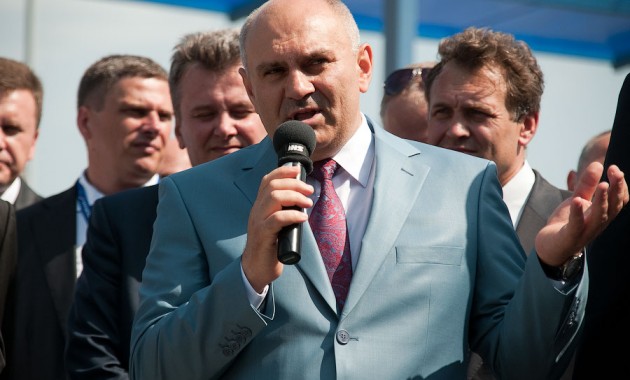
Idea of Merging Adygea with Krasnodar Region Reemerges Again
Publication: Eurasia Daily Monitor Volume: 12 Issue: 208
By:

On November 6, Russian President Vladimir Putin met with Adygea’s governor, Aslan Thakushinov. The governor boasted that economic conditions in the republic are improving under his leadership. According to Thakushinov, Adygea’s own revenues increased three-fold while the subsidies the republic receives from Moscow were reduced by over 60 percent in recent years, to 39 percent. Thakushinov also said the republic was treating refugees from Ukraine well, adding, in passing: “We also take care of the refugees from Syria.” Adygea’s leader emphasized that the republic’s population is 63 percent “Slavic” while 25 percent are Circassians. Thakushinov sounded quite reassuring and almost Soviet, saying that “the social situation in the Republic of Adygea is calm, and people are engaged in constructive labor [sozidatelny trud]” (Kremlin.ru, November 6).
Thakushinov’s blissful report about the situation in Adygea, however, did not reassure Russian analysts, who think the governor is serving his last term in office. Reportedly, Moscow’s primary concern with Thakushinov is that he has been building his clan structures in the republic. In particular, his nephew, Murat Kumpilov, who is the republic’s prime minister, has long been considered his successor. Jambulat Khatuov, the former first deputy governor of Krasnodar region, is considered among the strongest contenders for the position of the governor of Adygea (Kavkazskaya Politika, November 10).
Adygea is a small republic in the northwestern Caucasus and an enclave inside Krasnodar region. Its population is about 500,000, while Krasnodar region has a population of about 5.5 million. Adygea was considered to be among the small regions slated for amalgamation with larger ones. Apart from the fact that Adygea is surrounded by Krasnodar region, the city of Krasnodar is on the administrative border with Adygea, many of whose residents commute to Krasnodar for work. Besides, prior to 1992, Adygea was officially part of Krasnodar region, as an autonomous oblast. The amalgamation project, however, did not work, largely due to a mobilization of the Circassians. The significance of the possible change of Adygea’s leadership is that Moscow may revisit its plans for absorbing Adygea into the larger Russian-speaking Krasnodar region.
Kavkazskaya Politika commentator Filipp Gromyko wrote last week that Thakushinov’s primary achievement over the past nine years was that he proved Adygea can survive on its own without merging with Krasnodar region. Adygea’s per capita regional GDP doubled between 2006 and 2013; and according to official statistics, the republic received close to $4 billion in investment over the past nine years, with 8,000 new jobs created. Adygea’s mountains attract a substantial number of tourists from Krasnodar, which allows the republic to enjoy a certain level of prosperity. Most importantly, the republic is not considered to be at risk for insurgency-related violence (Kavkazskaya Politika, November 10). Adygea is administratively part of the Southern Federal District, although unofficially and geographically it is part of the North Caucasus.
When Aslan Thakushinov underwent heart surgery in Germany back in 2011, rumors spread that his resignation was imminent and that he would be replaced by Kumpilov, his nephew. Interestingly, Krasnodar’s Khatuov was, at that time, also considered a possible contender for the post of Adygea’s governor. Earlier, in 2008, then–Krasnodar regional governor Aleksandr Tkachyov unexpectedly appointed Khatuov as the acting mayor of Sochi (Natpressru.info, July 3, 2011).
The Kremlin has good reasons to trust Khatuov, who reportedly showed extraordinary organizational skills during preparations for the Sochi Olympics in 2014 and the rehabilitation of the Krasnodar regional city of Krymsk following a catastrophic flood in 2012. Khatuov resigned from his post in the Krasnodar regional government after its governor, Tkachyov, was appointed Russia’s minister of agriculture (Kavkazskaya Politika, November 10). Given how close Tkachyov has been to President Vladimir Putin, having hosted the Olympics in Sochi, it is quite possible Khatuov will rise to the post of governor of Adygea.
It is interesting that no ethnic Russian currently appears to be under consideration for the post of Adygea’s governor. Ethnic Russians comprise nearly two-thirds of Adygea’s population, but politically they are quite powerless. The Union of Slavs of Adygea was once vocal about alleged violations of the rights of ethnic Russians in the republic and critical of the government. However, under Thakushinov, their activities gradually faded away (Natpressru.info, July 3, 2011) and little has been heard from them in the past several years.
With Moscow paving the way for political change in Adygea, the idea of amalgamation may again appear on the agenda. Instead of a direct merger with Krasnodar region, Moscow is likely to prefer first appointing the most pliable political figure to prepare the republic for such a step. Even though Circassian activists accused Thakushonov of indifference to Circassian issues, the governor of Adygea certainly did not crack down on Circassian activists, and the republic received some Circassian refugees from Syria. That may be something that Moscow will seek to change with the appointment of the next governor.




